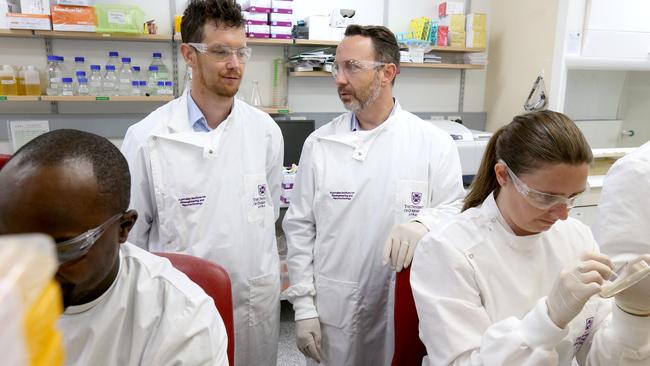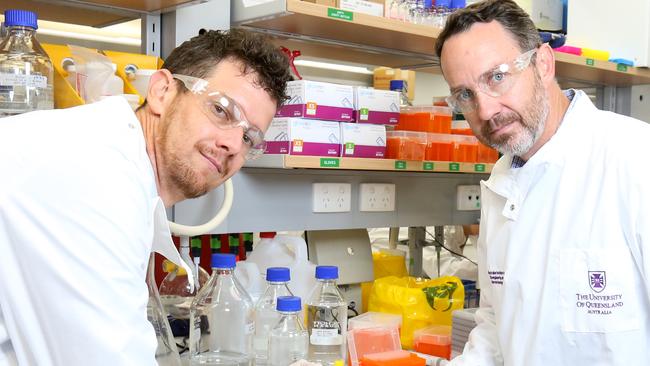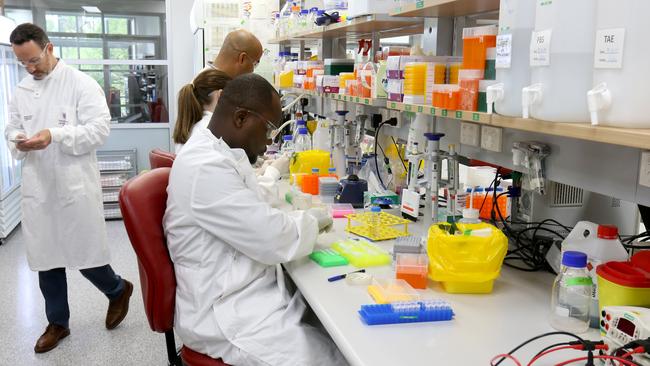University of Queensland scientists on schedule for human trials of a COVID-19 vaccine by July
Inside a Brisbane laboratory, a team of University of Queensland scientists are busily developing a vaccine to end the coronavirus pandemic. They’re on track to begin human trials by July. Here’s an insight into how it is unfolding.
QLD News
Don't miss out on the headlines from QLD News. Followed categories will be added to My News.
A TEAM of University of Queensland researchers are on track to begin human trials of a vaccine to protect against the pandemic strain of coronavirus by the beginning of July.
The team, which started working on a vaccine in late January, is already testing a product in mice with toxicology studies about to begin in rats.
Virologist Paul Young said the scientists had also sent their vaccine candidate to colleagues at a CSIRO manufacturing facility to prepare doses for studies at the Australian Animal Health Laboratory in Geelong.

“Ferrets were chosen because they respond similarly to the way humans respond to respiratory infections,” Professor Young said. “That’s an ideal model to be looking at protection. We’ll be immunising those animals and be looking to see whether the vaccine protects them from a viral challenge.”
The team of about 20 researchers, led by Professor Young and colleagues Dr Keith Chappell Dr Dan Watterson and Professor Trent Munro, are on schedule for the first phase of human testing to begin in early July.
“We’re going to try to get to the point where we have a workable vaccine at scale by the end of the year,” Professor Young said.
“Having said that, you can be confident, but no-one can predict anything in science.”
The researchers have split themselves into three groups and are working in three separate laboratories to ensure that if someone is infected with COVID-19, forcing some of the scientists into quarantine, work on the vaccine can continue.
Talks have already begun into whether the vaccine, dubbed S-clamp, could be manufactured in Australia using existing capacity.
The vaccine has been developed using University of Queensland-designed molecular clamping technology, patented by the university’s commercial arm, UniQuest.
Until the UQ scientists’ work on a COVID-19 vaccine, their research had largely been experimental.
“This is the real deal,” Professor Young said.

“In a research laboratory environment, you often think of new ways to do things. We’re not embarking on those new ways at this stage. We have a very focused path we’re following.
“We’ve been doing similar work with a wide range of viruses for quite a few years now. We were primed ready to go into something unknown.”
The UQ team have created similar vaccines for more than 10 different viruses.

“In each and every case we’ve tried, we’ve induced a very good immune response in animals and in those where we’d examined protection in a suitable animal model, we’ve shown that they work. With that background, we were confident that this one would work. Having said that, none have progressed to human trials yet.”
Coronaviruses are named after the Latin word corona, which means crown or halo, due to the crown-like spikes of protein on the surface of their cells.
Professor Young, head of UQ’s School of Chemistry and Molecular Biosciences, said the vaccine candidate was based on COVID-19’s spike protein, involved in the fusion of the virus with human cells.
“That fusion is absolutely critical for virus infection,” he explained.
For the virus to be able to fuse with human cells, the spike protein undergoes a dramatic structural change.
Professor Young said the UQ team had developed a molecule in the laboratory, which locked the spike protein into its pre-fusion state.
“This directs the immune response to the right target, so the body can target the virus before it has a chance to invade,” he said.
The researchers are trying to accelerate the development of the vaccine, with many of them working seven days a week.
But Professor Young said he needed more funding to be able to fast-track it onto pharmacy shelves.


